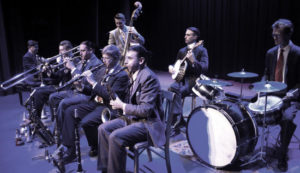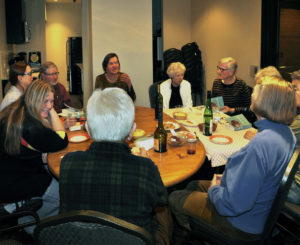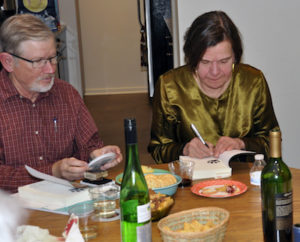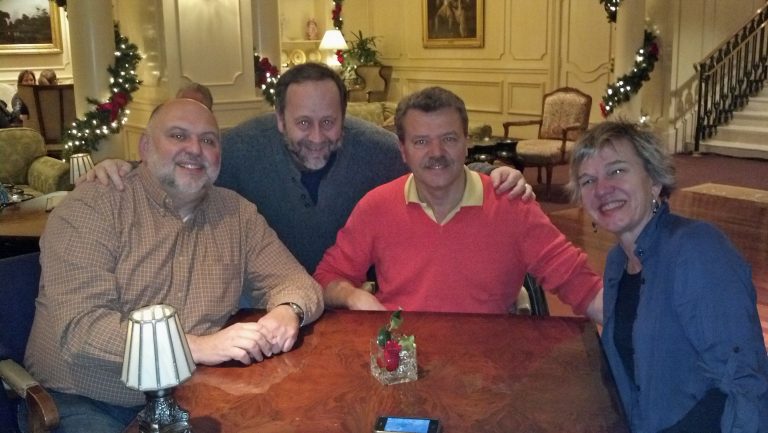Mondays with Mike: Hello in there
April 30, 2018 • 6 Comments • Posted in Mike Knezovich, Mondays with MikeBeth’s in Florida, sitting at a table with her sisters and boxes of wine and bottles of wine and talking. About what? I don’t know. They do this once a year, and they leave the rest of their families out of it, which is the best for everyone all the way around.
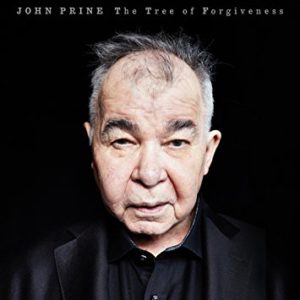
The cover of John Prine’s newly released “Tree of Forgiveness.”
On Saturday I headed down to Urbana, or Champaign, or Champaign-Urbana, whatever you want to call it. Went to see John Prine, thanks to Steven, of Steven and Nancy, the couple who adopted Hanni. Steven manages the Virginia Theater, and he tipped me off to Prine’s appearance months ago.
Before the show I had dinner with a buddy and his wife, dear friends from back in our college days, Kenwood and Lori. Kenwood and I go back to our freshman year in college. We have stories. Stories that we mostly keep to ourselves. Lori entered the picture a year or two later. We were thick as thieves. They visited my lonely self after I took a job in Washington, D.C., after college, which helped keep me afloat during a difficult time.
Then life took over. They had two daughters, Kenwood built a thriving business, we had Gus, Beth lost her eyesight. All that stuff. We stayed connected, just barely, drifting in and out of contact with one another. Kenwood and I occasionally attended motorcycle race track days, where one can do a sort of Walter Mitty experience, lean way over in the curves, and not have to put up with car drivers on cell phones. Fast, fun, and safer than public roads.
Too much time had passed between our last get-together. But, as I was reminded on Saturday evening, it’s like riding a bicycle. We picked up and were off to the races from the get-go.
After a meal and catching up, Lori headed for home and Kenwood and I headed for the show at The Virginia, a gem of an old movie theater that’s been beautifully restored. The warm-up act was two guys called The Milk Carton Kids. Well, two guys and two acoustic guitars, and at first I was thinking about the scene in The Blues Brothers when John Belushi destroys the folk singer’s guitar.
But they were terrific. Great harmonies, pretty amazing guitar picking, and deadpan comedy between songs.
Then the main act commenced. There was minimal stage set-up and equipment. There was Prine, a lead guitarist, a pedal steel guitarist (who also played mandolin and fiddle, I hate those showoffs), a drummer and an upright bassist. The backdrop was an image of the Paradise, Kentucky post office.
I kinda grew up with John Prine. I first heard his music performed by, of all people, John Denver, who included a rendition of “Angel from Montgomery” on one of his albums.
As I watched and listened with my old friend, I was gripped by something akin to nostalgia, but better than that. Prine’s songs are timeless. The words and music take you places on their own. And, music being what it is, his songs took me to places and times when I first listened to them. Some of those places and times, years ago, alongside my friend Kenwood. It was kind of transcendant.
Prine’s songs are about humans, trying to do their best, failing a lot, wanting, longing, striving, and sometimes succeeding in what counts most—connection to others. All done with a sense of humility, and humor.
Occasionally I looked over at my longtime friend and thought, wow, where has the time gone? Still, I thought, after all this time, we’re the same people.
And then again, we’re not.
After a fantastic show, Kenwood and I convened for a beer at a local brewery called The Blind Pig. No TVs, just conversation. He and I covered a lot of ground in a short time. Mortality. Do you believe in the afterlife? Politics. All sane, honest, and heartfelt. I was reminded of why we became friends in the first place.
Before we headed our separate ways, my friend said, simply, “You know, I’ve had a great life.”
“So have I,” I said, and we drank a toast.
